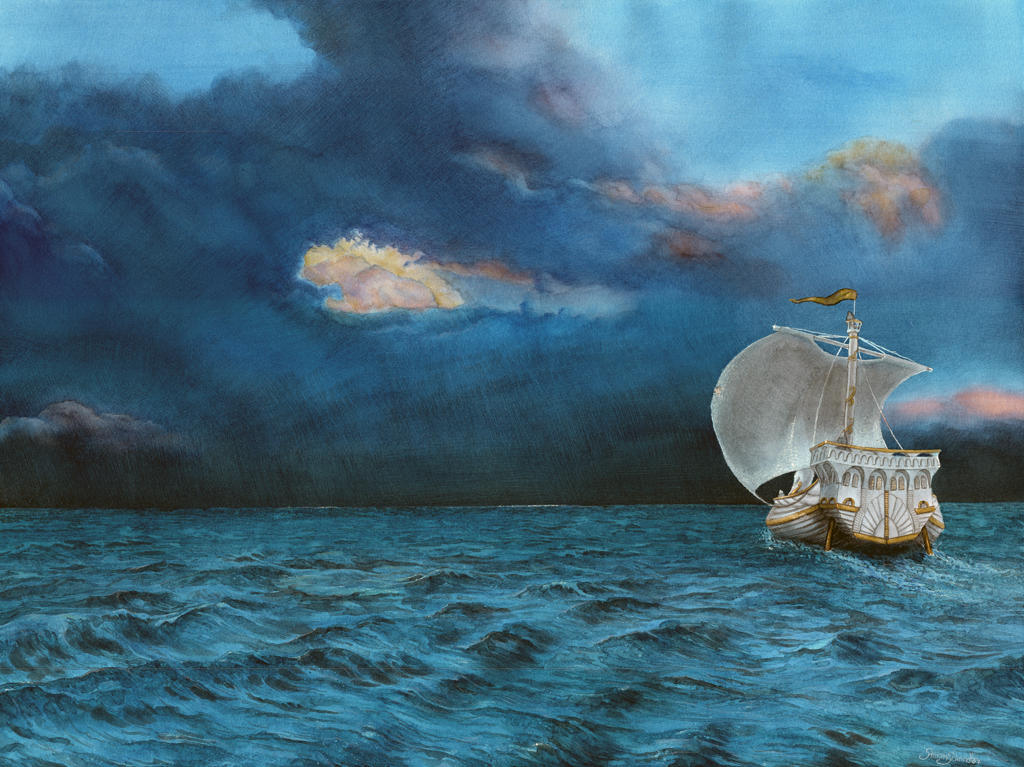Though the voyage is not easy, it is known that a mariner who can find the Straight Road can sail beyond the edges of the world and reach the stars, islands of bright light studded into a silent, dark, astral sea, colder than the grave and vaster than imagination.
The first thing an astral sailor must know is that one may not sail to any star at any moment. The Straight Road leads away only to the West, and one may find it only when sun and moon set as one. The astronaut sets their course only by the star that rises opposite the setting of the Sun. They will know their course is true if the heavens cease to turn, their guide-star rising no higher than a beacon from an impossible shore.
When the first dawn of the voyage should break, the ship will first come upon rough waters. Though stirred by no wind, the seas will lash the ship and its crew as though driven by a gale. The violence of the night is no illusion; many a star-ship has been ground to pieces by this storm that rages without a sound but the churning of the depths. Some turn back here, though not all who do are able to find the road home behind them and those who do not perish in the terror of the night.
When the sun should again set behind the star-men, the ship will see instead darkness pursuing them. The heavens split as one follows the Straight Road, the very stars fleeing the growing blackness of the ship's wake. Every light of the firmament, save only the guide-star, will roll down behind the horizon until the ship cuts through a great empty sea under a black sky towards a single mote of pale light. At this point it is death to attempt to turn back or turn away; the ship that does will lose sight of its guide-star and wander hopelessly in the utter darkness for, sailors say, only the straight course is short enough to follow. Perhaps one of these ships in a thousand would find the harbor of an outlying star, though by then its crew will be hollow men, broken by the endless night.
Some say that the tigh-men, the star-folk whom the Masters enslaved to their bane, were sired of old by such lost sailors.
But a crew that sails true through the deepest night will find their guide-star, in time, looming closer. They will come at length to an isle, an impossible isle like unto a great shallow bowl set into in the sea, though the waves lightly lap its coasts and rush in to fill it not. At the center of each star, a great mountain spire rises just above the level of black waters around, and all about it shines a cool light that cuts through the black like a sword.
Though not every star is peopled, most that can be guide-stars are (often by the children of the men who in former times themselves found the Straight Road). These, the stars of the ecliptic, are most easily navigated, ringing the impossible vastness of the sea of night. Sailors of the astral seas know, however, that the seas are wider than any map can show; to ships that sail side-by-side will find ever more water between them unless they steer towards each other. From a star in the deep night back to the ecliptic and out again to another may be a journey of days or weeks, but from one to the other a journey of years, decades or even centuries.
The astronaut who wishes to return has two courses open, a hard course and an easy course. The easy course, as it were, is to follow the needle of a compass (which still points true, even in the sunless seas of the firmament) to one of the poles, and thence to sail to the polar seas of the mortal world on an aurora. However, know that in the polar skies the Masters still lurk, biding their time and scheming against the might of the tigh-men who banished them from their ecliptic realms.
The difficult course is to return to the mortal world by the Straight Road. It is made difficult by the fact that there is no light to guide a ship along the reverse course. Very soon the ship will lose sight of the port they sail from. The only way back is to follow the seabirds of the night, the gulls and terns and alabatrosses that sometimes fly the Straight Road themselves to feast on the fish of the heavens (whose flesh is a sweet as cakes seasoned with choice spices). It is not easy to follow these birds by lamplight, soaring through an empty sky. And it is quite easy to lose sight of one's bird in the windless storms, since the rush of the waters bothers them not at all.
One has no guarentee of finding returning birds to follow, though it is said that when a star-sailor's left-behind lover or beloved friend or ailing parent laments their absence, a seabird takes wing into the West...

Very nice, the last two paragraphs are especially mournful in that wonderful old-wives-tale way
ReplyDelete